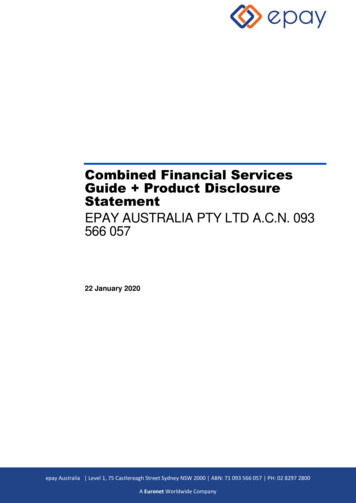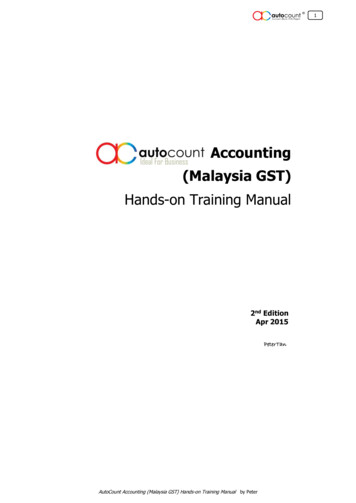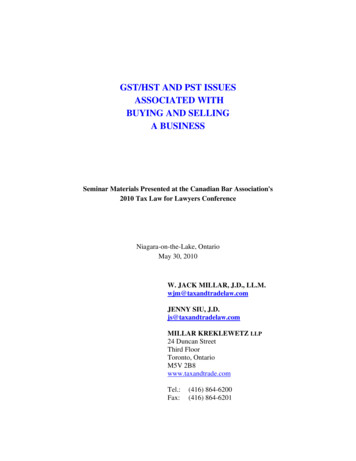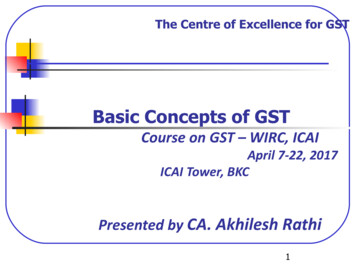
Transcription
GST on CorporateGuaranteesEmail: info@tattvamadvisors.comAddress: JD-2C, 2nd Floor,Website: httwww.tattvamadvisors.comPitampura, Delhi 110034
2GST ARTICLE1.Introduction . 32.Guarantees and Indemnities (Indian Contract Act, 1872) . 43.Corporate Guarantee. 6Corporate Guarantee and Personal Guarantee . 6Corporate Guarantee and Bank Guarantee . 6Laws Governing Corporate Guarantees . 84.GST on Corporate Guarantee without consideration . 10Applicable Provisions . 10Analysis. 11Corporate Guarantees under Service Tax regime. 11Corporate Guarantees under GST regime . 13Corporate Guarantees as actionable claim . 16Valuation of Corporate Guarantees . 19
31. INTRODUCTIONThe Goods and Services Tax Regime brought plethora of changes to the pre-existing taxationregime of the country. In the current paper, the author has made efforts to take into account awholesome view of taxability of corporate guarantees without consideration under GST regime.In Chapter 2, the scope of guarantees and indemnities are deliberated upon. Chapter 3 refersto understanding the meaning of corporate guarantees and how it is different from personalguarantee and bank guarantee. Chapter 4 refers to the taxability of corporate guarantee underthe GST Regime.
42. GUARANTEES AND INDEMNITIES (INDIANCONTRACT ACT, 1872)2.1.Guarantee is defined under Section 126 of the Indian Contracts Act, 1872. A guaranteeis a contract to perform the promise, or discharge the liability of a third person in case ofhis default. The three parties to the contract are:a. the person who gives the guarantee is called the Surety,b. the person for whom the guarantee is given is called the Principal Debtor, andc. the person to whom the guarantee is given is called the Creditor1.For example, if A advances a loan of Rs. 1,000 to B and C promises to A that if B doesnot repay the loan, C will repay it on his behalf. This is a contract of guarantee. Here Bis the principal debtor, A is the creditor and C is the surety or guarantor\2.2.A contract of indemnity as defined under Section 124 of the Indian Contracts Act, 1872,is a contract by which one party promises to save the other party from loss caused tohim by the conduct of the promisor himself, or by the conduct of any other person2.For example, C enters into a contract to indemnify B against a consequence of legal suitthat may be filed by F in respect of a certain sum of money of Rs. 500. Such a contractmay be expressed or implied. The above example is of an expressed contract, however;if any person acts on request of another and incurs any expenses, then such a personcan recover such expenses from the person who requested the same. This instance isan implied contract of indemnity. The two relevant parties are:a. The Indemnifier (person who makes good of the loss), andb. The Indemnified or indemnity holder (person whose loss is made good).2.3.A contract of insurance is also one of the examples of an indemnity contract under theEnglish Law. Such a contract has a consideration attached to it in form of the insurancepremium. However, under the Indian Contracts Act, 1872, the contract of indemnity isrestricted to the indemnification of the loss caused by the promisor or any other person.Therefore, the loss caused by any accidents or event that are not concerned with theconduct of any person, appears to be out of scope of such indemnification.12Section 126 of the Indian Contract Act, 1872 (Act No. 9 of 1872)Section 124 of the Indian Contract Act, 1872 (Act No. 9 of 1872)
52.4.Therefore, a contract of guarantee and such as of indemnity must satisfy all the elementsof a valid contract. However, when it comes to consideration of a contract, there is aspecial feature with regard to contract of guarantee. The consideration received by theprincipal debtor is sufficient for surety for the purpose of this contract of guarantee. Thus,anything done or any promise made for the benefit of the principal debtor may be asufficient consideration to the surety for giving the guarantee3.2.5.Distinction between the Indemnity and guarantees:BasisPartiesIndemnityThere are only two parties: theindemnifier and the indemnified.The liability of the indemnifier isprimaryGuaranteeThere are three parties: the surety, theprincipal debtor and the creditor.The liability of the surety is secondaryLiabilityand the primary liability us on theDebtor. The debtor making a defaultrenders the surety liable for repayment.Theindemnifierdoesnot The surety acts on the request of theActnecessarily act at the request of the principal debtor.debtor.Existence of The indemnifier undertakes an There is an existing debt or duty, whichindemnity based on the happening is guaranteed by the surety.debt/ Dutyof a contingent event i.e., thehappening of a loss.Right to sue The indemnifier cannot sue third- The surety has the right to file suitparties in his own name unless the against the Principal debtor uponpromise (indemnified) relinquishes discharge of the debt or duty.his right in favour of the promisor(indemnifier).Number of There is only one agreement i.e., There are three agreements i.e.,agreementbetween agreement between the creditor andagreements theindemnifier and indemnity holder.principal debtor, the creditor and suretyand surety and principal debtor4“Whether a contract is one of guarantee or of indemnity is aquestion of construction in each case”34Section 127 of the Indian Contract Act, 1872 (Act No. 9 of 1872)State Bank of India v. Mula Sahakari Sakhar Karkhana AIR 2007 SC 2361
63. CORPORATE GUARANTEE3.1.After establishing the distinction between the fundamental nature of a Contract ofIndemnity and Guarantee, let us understand the concept of corporate guarantee.3.2.A Corporate Guarantee is a guarantee in which any corporation agrees to be responsiblefor the financial obligations of, or the performance of, contractual obligations by theprincipal debtor to the creditor, in the event the principal debtor fails to discharge hisobligation to the Creditor. These transactions usually include inter- group Corporateguarantees, which are given to facilitate a smoother financial functioning to the ‘Related’or ‘Associated’ persons.3.3.Corporate Guarantees without consideration are quite generic transaction amongcompanies wherein holding or parent companies issues corporate guarantee to variousBanks or other Financial Institutions as a collateral security for the credit facilities availedby its subsidiaries. Also, corporate guarantee, is unsecured, which means it is notsecured by or tied to any specific asset of the surety. Corporate guarantee to relatedparties without consideration are based on the business needs and for group synergy.Corporate Guarantee and Personal Guarantee3.4.Corporate Guarantee is different from Personal Guarantee in the sense that PersonalGuarantee is a promise made by an individual being in a capacity of an executive orpartner of a business which has taken any debt and the promisor assumes a personalresponsibility of repayment upon default by the business. For example, as per thebanking practices the banks require collateral security for providing financial assistancewhich may generally takes the form of a personal guarantee taken from a director/partner of such Borrower Company/ firm.Corporate Guarantee and Bank Guarantee3.5.A Bank Guarantee is also similar to personal guarantee but, the only difference is thatthere, is a Promise/ commitment given by a bank to a third party in this case. The bankassures the third party that in event of any non-performance by the bank’s customer, thebank will honour the claim against the guarantee. A bank guarantee is a legally
7enforceable contract and constitutes of three parties. The banker is the guarantor whoassures the third party (beneficiary) to pay him a certain sum of money on behalf of hiscustomer, in case the customer fails to fulfil his commitment to the beneficiary. However,a bank guarantee is also inherently different from a corporate guarantee. A bankguarantee is a surety that the bank will pay off the debts in case the business entity isunable to do so. For this, banks run risk assessments to ensure that the guaranteed sumcan be retrieved, and bank may also require a security in the shape of cash or capitalassets. However, corporate guarantee, apart from the fact that no fee is charged,corporate guarantees are issued without any security or underlying assets. For thepurpose of income tax, this difference has been established by various cases. Few ofthe cases are discussed below:Glenmark Pharmaceuticals Ltd vs. Addl. CIT5 Corporate guarantees are issued in order to safeguard and support the financialhealth of their Associate enterprises or to facilitate smoother functioning of theenterprise. However, the bank provides bank guarantees as a part of their generalcourse of business and charge the consideration accordingly. Bank guarantees are reliable and infallible instruments of security and a failure inhonouring the guarantee is treated as a deficiency of services under the bankinglaw. Although, Guarantor is bound by contract law and has the right to sue in caseof corporate guarantees, these are not infallible. Thus, there is a fundamental difference in the functional approach of both typesof guarantees.Micro Ink Limited v. ACIT6 Bank guarantee is a surety by the bank to pay off any debts or liabilities onaccount of any loss to a person or entity. For such guarantees, a guarantee feeis charged by the bank even though, such guarantees are backed by deposits. But the corporate guarantees are issued without any underlying assets orsecurities. These guarantees are majorly motivated by business needs. 56Thus, a comparison cannot be drawn in between the two.TS-329-ITAT-2013(Mum)-TPMicro Ink Limited v. ACIT (ITA No. 2873/Ahd/10)
8Laws Governing Corporate Guarantees3.6.There are a number of laws in existence which governs/ regulate the contract ofcorporate guarantee such as:Companies Act, 2013 Section 185 enumerated inter- corporate loans which are prohibited to beoffered by any company. This provision specifically disallows the companiesfrom providing loans, guarantees and securities in favor of its directors or to anyother person in whom the director is interested in. However, the provision makesa few exceptions as following:-Any loan made by a holding company to its wholly owned subsidiarycompany or any guarantee given or security provided by a holding companyin respect of any loan made to its wholly owned subsidiary company7; or-Any guarantee given or security provided by a holding company in respectof loan made by any bank or financial institution to its subsidiary company8. Therefore, the Companies Act, 2013, allows for Inter- Corporate guaranteesamong related parties subject to the condition that such loans when provided bythe holding companies be used by the subsidiary companies for its principalbusiness activities.Foreign Exchange Management (Guarantees) Regulations, 2000 The essence of any transaction being covered under the Foreign ExchangeManagement act, 1999 (hereinafter referred as ‘FEMA’) is that all currentaccount transactions are permitted except those specifically prohibited by lawand all capital account transactions are prohibited exceptthoseexpresslyprovided by law. The capital account transactions alters the assets or liabilities, includingcontingent liabilities outside India of persons residing in India, or assets orliabilitiesinIndiaof persons residingoutsideIndia. Therefore, anytransactions that decrease or increase the assets or liabilities by an Indianresident or even a non-resident, falls under the ambit of FEMA.78Section 185 (3) (c) of the Companies Act, 2013 (Act No. 18 of 2013)Section 185 (3) (d) of the Companies Act, 2013 (Act No. 18 of 2013)
9 Therefore, in order to regulate the guarantees, Foreign Exchange Management(Guarantees) Regulations, 2000 were issued by the Reserve Bank of India(hereinafter referred to as 'RBI') in exercise of the powers conferred upon theunder Section 6 (3)(j)(i) read with Section 472 of the FEMA. These regulationshave put restrictions on the issue of guarantee by a person resident inIndiaagainst a debt, obligation or any other liability owed by a person resident in Indiato a person resident outside India. Therefore, a special permission granted bythe RBI is the only mode of legitimizing such transactions.
104. GST ON CORPORATE GUARANTEEWITHOUT CONSIDERATIONApplicable Provisions4.1.The taxable incident under GST is derived from Section 7 of the Central Goods andServices tax Act, 2017 (hereinafter referred as “the CGST Act”). It provides that GSTwould be leviable on all the transactions which qualify as ‘Supply’, as may be applicable,except the supplies which are outside the purview of GST i.e., non-taxable supplies.4.2.In this regard, clause (a) of Section 7(1) of the CGST Act provides that supply includesall forms of supply of goods or services or both such as sale, barter, exchange, licenserental, lease or disposal made or agreed to be made for a consideration by a person inthe course or furtherance of business9.4.3.In view of the aforementioned definition of ‘supply’, it is ascertainable that anytransaction/activity would qualify as ‘Supply’ under clause (a) of Section 7(1) of theCGST Act, upon satisfaction of the below-mentioned conditions:a. the transaction/activity is made or agreed to be made for consideration; andb. the transaction/activity is carried out in the course or furtherance of business4.4.Further, Section 7(1) (c) of the CGST Act provides that the activities specified inSchedule I, made or agreed to be made without a consideration will be covered withinthe scope of the term ‘supply’. Section 7(2)(a) of CGST Act stated that activitiesmentioned under Schedule III of the act shall neither be treated as supply of Goods norsupply of services.4.5.Schedule I states activities to be treated as supply even if made without considerationwhich includes:“2. Supply of goods or services or both between related persons or betweendistinct persons as specified in section 25, when made in the course orfurtherance of business:9Section7 (1)(a) of CGST Act, 2017 (Act No. 12 of 2017)
11Provided that gifts not exceeding fifty thousand rupees in value in a financial yearby an employer to an employee shall not be treated as supply of goods or servicesor both”4.6.According to Schedule III, the activities or transactions which shall be treated neither asa supply of goods nor a supply of services include:“6. Actionable claims, other than lottery, betting and gambling.”AnalysisCorporate Guarantees under Service Tax regime4.7.Before analysing the taxability of issuance of corporate guarantee without considerationunder GST regime, it is important to understand first the implications under service taxregime.4.8.Section 66B of the Finance Act, 1994 (hereinafter referred as the ‘Finance Act’) was thecharging section according to which service tax levied at the rate of 14% on the valueof all services, other than those specified in the negative list, provided or agreed to beprovided in the taxable territory by one person to another and collected in such manneras may be prescribed.4.9.However, as per the definition of service under Section 65B (44) of the Finance Act,1994, for any transaction to qualify as a service, following ingredients must be satisfiedcumulatively:(a) There must be an activity.(b) Such activity must be carried out by one person for another person.(c) Such activity must be carried out for consideration.4.10. On the basis of the forgoing discussion, it can be said service tax was applicable onlyon provision of a service, and there is provision of a service only if one person isperforming any activity for another person for a consideration. If any of the elements,i.e., receipt of consideration or obligation for performance of activity is missing, therecannot be provision of a service. Accordingly, in such a case, liability for payment ofservice tax would not arise.
124.11. Accordingly, in case of issuance of corporate guarantees to banks on behalf of therelated parties, the first and second conditions (activity and activity from one person toanother), as required under Section 65B(44) of the Act, stand satisfied. However, thethird condition (i.e. the said activity must be carried out for a consideration), does notstand fulfilled. Accordingly, the said activity would not tantamount to be service underSection 65B(44) of the Finance Act.4.12. Reference can be placed on the position taken by the Hon’ble CESTAT Chandigarh inthe case of M/s DLF Cyber City Developers Limited vs CST, Delhi-IV (Appeal No.ST/60753/2017). It was observed as follows:“It is an admitted fact that the appellant-assessee has not received any considerationfrom either from the financial institutions or from their associates for providing corporateguarantee, in that circumstances, no service tax is payable by the appellantassessee. Moreover, the demand raised in the show cause notices are on the basis ofassumption and presumption presuming that their associates have received the loanfacilities from the financial institution at lower rate, therefore, the differential amount ofinterest is consideration, but there is no such evidence produced by the revenue on thatbehalf. In that circumstances, we hold that the appellant-assessee are not liable to payany service tax on corporate guarantee provided by the appellant assessee to variousbanks/financial institutions on behalf of their holding company/associate enterprises fortheir loan or over draft facility under Banking and Financial Institutions after or before01.07.2012.”(emphasis supplied)4.13. Further, it is pertinent to note that Rule 3 of the erstwhile Valuation Rules under ServiceTax, which provides for adaptation of the value of similar service by the same serviceprovider, has application only in cases where value of a service is not ascertainable.Therefore, in the case where no consideration is provided by the service recipient, thesaid Rule 3 will have no application.4.14. Reliance for this view can be placed upon the recent case of Magarpatta TownshipDevelopment & Construction Co Ltd Versus Commissioner Of Central Excise, Pune-III,2013 (7) TMI 669 - CESTAT Mumbai wherein the Hon’ble Tribunal observed that thereis no deeming provision in the service tax law providing for addition of notional amountsto the value/ price charged.4.15. In nutshell, under service tax regime, the department argues it to be an activity carriedout by parent company towards subsidiary companies equating it with the bank
13guarantees issued by banks for securing the payments. However, as dealt by judicialforums, a service without a consideration cannot be made leviable to service tax. It hasalso been observed that there is no provision in the scheme of valuation of servicewherein notional amount can be deemed as a consideration for the purpose of arrivingat value for payment of service tax. There is no deeming fiction or notional concept inthe Act or the rules framed thereunder which provides for deeming any notional value asthe value of the service for the purpose of discharging service tax liability thereon.10Service Tax Regime:“No Consideration – No Service – No levy”Corporate Guarantees under GST regime4.16. When it comes to supply without consideration, clause (c) of Section 7(1) of the CGSTAct provides that the activities specified in Schedule I, made or agreed to be madewithout a consideration will be covered within the scope of the term ‘supply’ whichinclude supply of goods or services or both between related persons or between distinctpersons as specified in section 25, when made in the course or furtherance of business.4.17. In nutshell, the definition of supply covers Schedule I which deems certain activitieswithout consideration also as supply and it includes supply of goods/services betweenrelated persons made in the course or furtherance of business. Accordingly, it cannot besaid that corporate guarantees are issued without consideration and not leviable to GSTdue to the aforesaid entry in Schedule I. The said entry under Schedule I under CGSTAct is designed by legal fiction on the principle that relationship itself is consideration.Thus, it appears that corporate guarantees, being a transaction between related personwithout consideration, will be deemed as supply under Schedule I and will be taxableunder GST.4.18. However, let us analyse whether issuance of corporate guarantee is a supply of servicesper se.10State Bank of India v. Mula Sahakari Sakhar Karkhana AIR 2007 SC 2361
144.19. At this juncture, reference can be made to provisions of transfer pricing under IncomeTax since taxability of corporate guarantee has been a bone of contention under Incometax as well.Corporate Guarantee under Income Tax Chapter X of the Income Tax Act, 1961 lays down the provisions that governtransfer pricing in India. Section 92B provides that any income arising out of aninternational transaction entered by a taxpayer with its associated enterprise, shallbe computed taking into regard arm’s length price. Therefore, cases wherein anycommission for Corporate Guarantees are received, from overseas, or vice versa, aquestion usually comes whether the provisions of Income taxes get attracted. The assesses have taken various arguments before the courts which inter aliaincludes that issuance of corporate guarantee without consideration does not qualifyto be international transaction since it is not a provision of services Reference here can be made to the decision of Micro Ink11 wherein ITAT observedas follows:40. . Let us now compare this kind of a guarantee with a corporate guarantee. Theguarantees are issued without any security or underlying assets. When theseguarantees are invoked, there is no occasion for the guarantor to seek recourse toany assets of the guaranteed entity for recovering payment of defaulted guarantees.The guarantees are not based on the credit assessment of the entity, in respect ofwhich the guarantees are issued, but are based on the business needs of the entityin question. Even in a situation in which the group entity is sure that the beneficiaryof guarantee has no financial means to reimburse it for the defaulted guaranteeamounts, when invoked, the group entity will issue the guarantee neverthelessbecause these are compulsions of his group synergy rather than the assurance thathis future obligations will be met. We see no meeting ground in these two types ofguarantees, so far their economic triggers and business considerations areconcerned, and just because these instruments share a common surname, i.e.'guarantee', these instruments cannot be said to be belong to the same economicgenus. Of course, there can be situations in which there may be economicsimilarities, in this respect, may be present, but these are more of an exception thanthe rule. In general, therefore, bank guarantees are not comparable with corporateguarantees.41. . As a plain look at the details of corporate guarantees would show, theseguarantees were issued to various banks in respect of the credit facilities availed bythe subsidiaries from these banks. The guarantees were prima facie in the nature ofshareholder activity as it was to provide, or compensate for lack of, core strength forraising the finances from banks. No material, indicating to the contrary, is brought onrecord in this case. Going by the OECD Guidance also, it is not really possible tohold that the corporate guarantees issued by the assessee were in the nature of11Micro Ink vs ACIT [(2016) 176 TTJ 8 (Ahd)]
15'provision for service' and not a shareholder activity which are mutually exclusive innature. In the light of these discussions, we are of the considered view, and are fullysupported by the OECD Guidance in this, that the issuance of corporate guarantees,in the nature of quasi-capital or shareholder activity- as is the uncontroverted positionon the facts of this case, does not amount to a service in which respect of which arm'slength adjustment can be done.44. As for the words 'provision for services" appearing in Section 92B, andconnotations thereof, our humble understanding is that this expression, in its naturalconnotations, is restricted to services rendered and it does not extend to the benefitsof activities per se. (Emphasis supplied) Similar lines of argument have been taken in various decisions under Income Tax.However, some of the decisions are in line with decision of Micro Ink (discussedsupra) and some have held corporate guarantee without consideration to beinternational transactions.4.20. Basis above decisions under Income Tax, an argument can be taken under GST thatissuance of corporate guarantee to related parties without consideration does not qualifyas supply of services since Corporate guarantee is entirely entrepreneurial in the senseand it is issued for maximization of gains for the recipient entity and thus the group as awhole. A guarantor does not arrange financing for the debtor, but merely executes afinancial instrument in its favour. These guarantees do not cost anything to theguarantors. Lastly, it can also be said to be a mode of ownership contribution, since it isgenerally given to compensates for the inadequacies in the financial position of theborrower and it can be said to be in the form of quasi-capital as well.4.21. Thus, a view is possible that there is no service activity undertaken and the companyissues the same in its capacity as a shareholder to protect its investment in securities.However, the department will definitely be disputing the above arguments.4.22. Also, to determine the taxability of Corporate Guarantee, reliance can also be placed onCircular No. 34/8/2018-GST dated 01.03.2018 wherein, it is provided that servicesprovided by Central or State Government to any business entity including PSUs by wayof guaranteeing the loan taken from financial institutions against consideration shall betaxable. Hence, the aforementioned circular supports the view that transaction ofguaranteeing loan with consideration qualifies as supply and therefore, is leviable toGST.
1612A view is possible that issuance of corporate guaranteedoes not qualify as supply of servicesCorporate Guarantees as actionable claim4.23. However, the next interesting argument could be whether issuance of corporateguarantee can be said as supply of actionable claim and therefore it should be outsidethe ambit of supply as per Schedule III of CGST Act.4.24. Schedule III of the CGST Act under Clause 6 mentions that actionable claims are not tobe considered either as a supply of goods or services.4.25. Section 3 of the Transfer of Property Act, 1882 defines actionable claim to mean claimto any debt, other than a debt secured by mortgage of immovable property or byhypothecation or pledge of movable property, or to any beneficial interest in movableproperty not in the possession, either actual or constructive, of the claimant, which thecivil courts recognise as affording grounds for relief, whether such debt or beneficialinterest be existent, accruing, conditional or contingent.4.26. From the above, it can be seen that actionable claims are primarily claims that arise withrespect to unsecured debts or a beneficial interest in movable property, regardless ofwhether such debt or beneficial interest be existent, accruing, conditional or contingent.4.27. In the case of Sunrise Associates vs. Govt. of NCT of Delhi & Ors.13, the Supreme Courtheld that,“an actionable claim is of course as its nomenclature suggests, only a claim. A claimmight connote a demand, but in the context of the definition it is a right, albeit anincorporeal one. Every claim is not an actionable claim. It must be a claim either to adebt or to a beneficial interest in movable property. The beneficial interest is not themovable property itself, and may be existent, accruing, conditional or contingent. The1213State Bank of India v. Mula Sahakari Sakhar Karkhana AIR 2007 SC 2361Sunrise Associates v. Govt. of NCT of Delhi & Ors. 2006 (5) SCC 603
17movable property, in which such beneficial interest is claimed, must not be in thepossession of the claimant. An actionable claim is therefore an incorporeal right.”4.28. At the outset, it is to be noted that corporate guarantee is not beneficial interest in anymovable property which is not in possession.4.29. Let us analyse whether it can be said to be claim to any unsecured debt.4.30. The meaning of debt can be derived from the Law Lexicon as: "a sum of money dueunder an express or implied agreement; amount due or payable from one person toanother in return for money, services, goods or other obligations."4.31. In the Black’s law dictionary, “a debt is a sum of money due by contract. It is mostfrequently due by a certai
which may generally takes the form of a personal guarantee taken from a director/ partner of such Borrower Company/ firm. Corporate Guarantee and Bank Guarantee 3.5. A Bank Guarantee is also similar to personal guarantee but, the only difference is that there, is a Promise/ commitment given by a bank to a third party in this case. The bank










